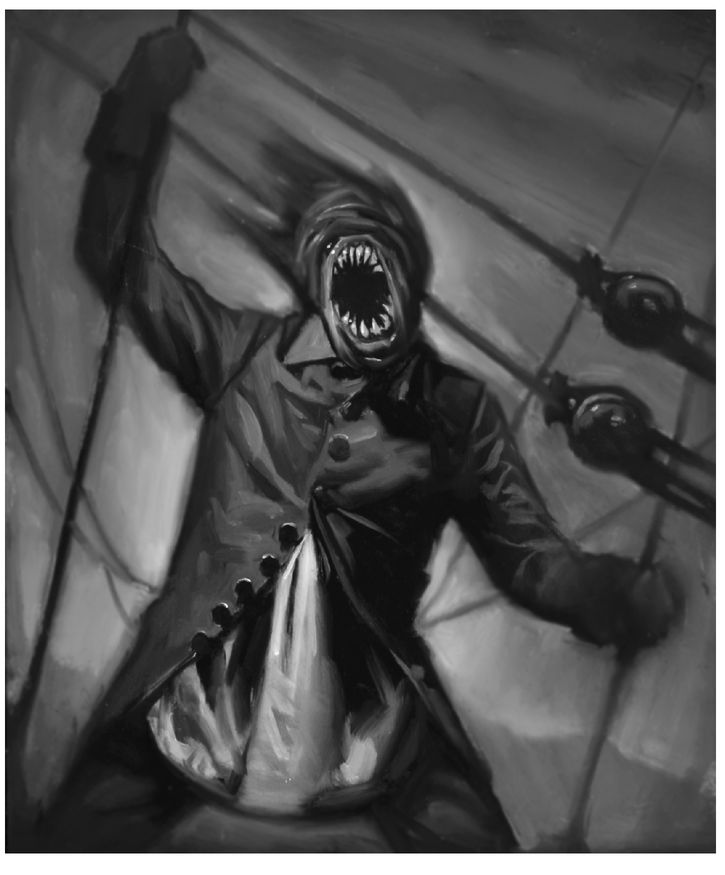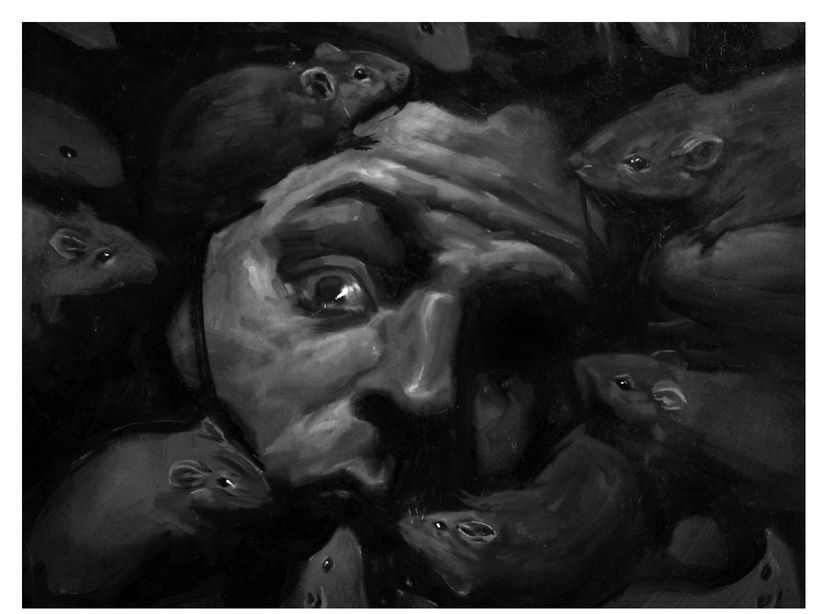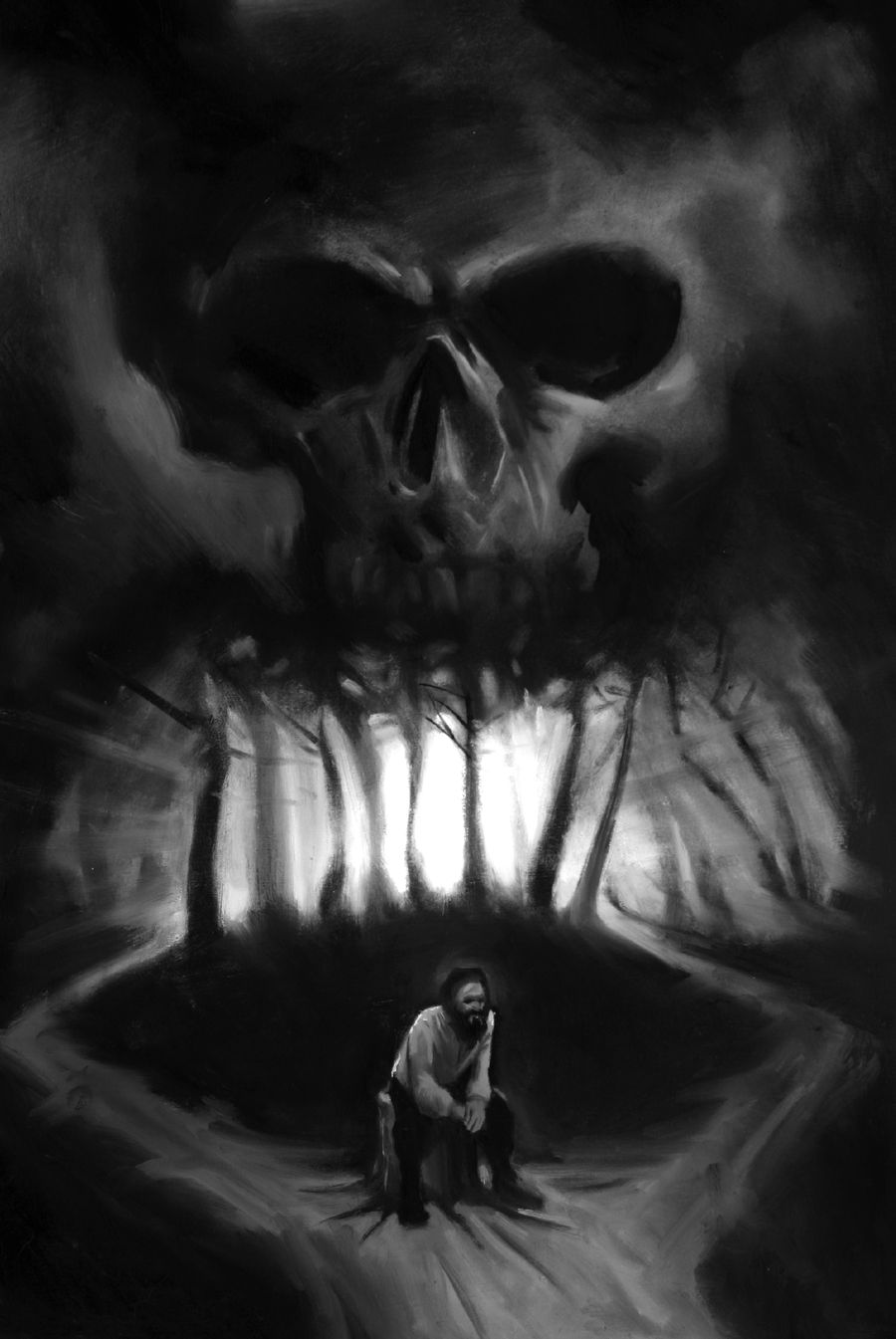More Bones (13 page)
Authors: Arielle North Olson

“Begone,” he shouted, thinking some strange creature had risen from the sea. But the scratching and moaning continued.
The door flew open. There was Malfri clinging to Jack's mother. There were his brothers. All were dripping wet, pale and gray, with horror written on their faces, their eyes staring at nothing.
“Give back my life,” moaned Malfri.
Jack rushed down to his boat and sailed into the storm, looking for his family. But all he found was a death boat, bottom side up, with a gaping hole in its keel.
He began to sob. “What have I done?”
Jack tried to lose himself in his work. But the moment he stopped sawing and hammering, the voices of his family returned. The moaning of Malfri was the worst to bear.
Bony fishermen began to rise out of the sea and search for Jack, reaching for him with their skeletal hands. He could no longer sleep.
He desperately wanted to know which of his boats were the death boats. He tested those stored in the boathouse, thumping the keels, searching for flaws. But he could find none. He no longer thought his boats were beautiful.
Even moonlight shining on the waves gave him no pleasure. For it let him see ghostly crews wading through the shallowsâand as they came closer, the stench of rot was almost unbearable.
He shouted, “Many more would have drowned if I hadn't built my boats. Go away!” But they swarmed around him, staring at him with their hollow eyes.
Jack was frantic. He fled in one of his boats, sailing out to sea.
He could barely stand looking at the broken planks floating by, pieces of boats, all green and slimy. Bony fingers reached out of the water and tried to grasp them, then slipped from sight.

Jack's boat skimmed through the waves, but it was not as seaworthy as it seemed. For it was not Jack who had set its keel in place.
That was the work of the evil draug.
Suddenly the draug appeared again, keeping pace with Jack as it sailed beside him. Jack was horrified to see that the back half of the draug's boat was missing. He turned pale. He could almost hear what the old fisherman had whispered so long ago.
“If it sails alongside you in a halfboat, prepare to die.”
“If it sails alongside you in a halfboat, prepare to die.”
“Begone!” Jack shouted at the draugâas if he could change his fate.
But the keel of Jack's boat started creaking and cracking and falling away. Water rushed in through a gaping hole, flooding the boat.
The last thing that Jack saw, before he sank beneath the waves, was the draug, grinning monstrously, licking its pointed green teeth.
The Peasants' Revenge
GERMANY
Â
Â
The peasants were terrified of Lord Hatto. Whenever he rode past, women dropped their loads of wood and darted through the nearest doorways. Children ran alongside mothers, hiding behind their skirts. Men hurried to cultivate the far sides of fields to avoid Hatto's stinging whip. Even cats fled. No one knew when Hatto would unleash one of his towering rages.
Â
The peasants were terrified of Lord Hatto. Whenever he rode past, women dropped their loads of wood and darted through the nearest doorways. Children ran alongside mothers, hiding behind their skirts. Men hurried to cultivate the far sides of fields to avoid Hatto's stinging whip. Even cats fled. No one knew when Hatto would unleash one of his towering rages.
The peasants wished he would be punished for his evil ways. But who dared to challenge such a powerful lord?
The only things that pleased Hatto were money and food. He spent hours counting his bags full of coinsâand even more hours eating. The moment he rushed down the castle stairs each morning, he began bellowing for smoked eels and blackbird pies. Then more eelsâand more pies. Finally, when he could not eat another bite, he pushed his vast body away from the table. He scowled when servants were slow to drape a cloak over his shoulders, grabbed his whip, and stomped off to his stables.
Pity the poor groom who did not have the lord's horse saddled and waitingâand pity the poor horse, ridden by such a harsh and heavy master.
Each day, Hatto rode to his bulging granaries to inspect the locks. He wanted to make sure his peasants had not taken even a handful of his wheat to feed their hungry children. Of course the peasants had grown the wheat, but they had grown it on Hatto's land, so Hatto claimed almost all of it for himself.
One day, when he was sure that his wheat was untouched, Hatto rode down the steep hillside to the Rhine River. He called across the water to a servant tending the stone tower on an island midstream.
“Did you stop every boat?” he bellowed. “Did you collect my tolls?” The servant nodded his head vigorously. He dared not fail. Imagine Hatto's fury if even one boat slipped by without paying for the privilege.
The lord spent the rest of the day hunting. He would never dirty his hands raising cropsâthat's what peasants were forâbut he enjoyed killing game for his table, especially little songbirds for his steaming pies.
When Hatto rode back to his castle, he whipped his horse into a gallop. It was time to eat, and he knew the cook was roasting the carcass of a young ox.
But when he burst into the kitchen, the cook muffled a shriek and tried to hide something behind his back. It was a kitten. Worse yet, it was chewing a scrap of meat.
“How dare you?” shouted Hatto. He kicked the kitten out the door. “I don't need any more mouths to feed.” He almost struck the cook as well. “You know I hate cats,” he snarled. But the savory smell of roast ox sent him rushing to the table.
By the time he went to bed, a heavy rain was falling. It rained the next day, too, and the next week, and the next month. In fact, no one could remember a wetter, colder spring. Seed rotted in the ground. Pastures were flooded. Farm animals grew thin.
The peasants soon ate their meager stores of food. Their vegetable gardens were sodden and bare. They begged the lord for wheat, but he refused. So they went to the forests to dig up edible roots and plants. They grew gaunt while the lord continued to feast.
Finally the peasants decided they must approach the lord together. Surely a starving crowd could persuade him to share his wheat.
When Hatto saw them gathering outside the castle door, he was angry. He saw no reason to help his peasants. Why did they keep pestering him? He was about to stomp back into his castle when a sly smile suddenly lit up his face. “Of course,” he said. “Come to the granary with me.”
The peasants were overjoyed. Maybe the lord would give them enough wheat to save their lives. Hatto unlocked one of his granaries and urged everyone inside. They were surprised to see that the granary was empty. The lord had sold the wheat for outrageous prices when everyone became desperate for food.
The peasants were even more surprised when Hatto suddenly slammed the door shut and bolted it. They cried out, begging for their freedom.
“They sound like a bunch of squealing mice, don't they?” scoffed the lord.
“Squealing mice?” echoed a frightened servant. He dared not disagree, but when Hatto told him to set the granary on fire, he fled in terror. So the lord threw the torches himself. Flames began to lick up the granary walls.
Hatto imagined the peasants suffering horrible, lingering deaths. But only part of his evil wish was fulfilled. There was death, but no suffering. Before the flames touched the peasants, an enormous bolt of lightning ripped down from the heavens. In an instant it destroyed the building and reduced everyone inside to ash.
Lord Hatto was knocked flat on his back. As he lay there, stunned, he watched a vast cloud of ashes rise into the sky. Then the cloud swirled and darkened and began drifting back to earth. He shook his head, blinking. He couldn't believe what he saw. The ashes were clumping together and turning into mice, thousands of huge, squealing mice with razor-sharp teeth and appetites far greater than Hatto's.
He staggered to his feet as mice rained down upon him. Each time he batted one away, ten more struck him, clawing at his clothes as they fell. He raced into the castle with the sea of mice nipping at his heels. So many swarmed through the kitchen door, he couldn't close it. No servants were there to help. All had fled when he set the granary afire.
While the mice paused in the kitchen to eat Hatto's great stores of food, he charged up the stairs. He bolted his bedroom door and jumped into bed. But even when he pulled the covers over his head, he could not escape the sounds of scampering feet, gnawing teeth, and unearthly squeals.
For once in his life, he wished he had been kinder. Not to the peasants, of course. He still was as hard-hearted as ever. But he did wish he had been kinder to catsâto mouse-eating cats.
He lay awake all night, listening to scurrying and squeaking from all corners of the castle. He heard the mice move from the kitchen to the great hall, where they climbed up the walls to chew on tapestries and family portraits. Finally they clambered up the stairs to gnaw holes through Hatto's bedroom door.
By the time the sun rose, they were swarming into the bedroom and shredding the very blankets under which Hatto was hiding.
The lord raced out of the castle and lumbered down the hillside to the Rhine. The mice weren't far behind. He leaped into a boat and started rowing.
I'll be safe on the island,
he told himself.
No mouse would swim across the river.
I'll be safe on the island,
he told himself.
No mouse would swim across the river.
Nevertheless, he bolted the door of the stone tower and climbed to its topmost room. He looked down from the window. What was that scum he saw on the surface of the water? It seemed to be moving toward the island.
As it came closer, he began to tremble. It wasn't scum. It was a mass of miceâall swimming his way.
Hatto rushed to the door of the tower room, slammed it shut, and bolted it. Then he barricaded it with bags of moneyâtolls collected from boat captains. But the doors of the tower were made of wood, and the teeth of the mice were sharp.
Even when he pressed his hands over his ears he could hear the horrendous gnawing at the door below. Wood splintered. Toothy, whiskered faces punched through ever-widening holes. Hoards of mice scampered up the tower stairs, sniffing for blood.
Hatto crouched in a corner, whimpering, “Kitty, kitty, kitty,” but none came. The gnawing grew closer, the squeals deafening, and the mice, crazed by hunger, soon poured into the room.
Later that morning, the toll collector rowed out to the island. He could scarcely believe what he saw. The tower doors were full of ragged holes. Ashes were scattered everywhere. He was tempted to jump back into his boat, but he gathered up his courage, climbed the stairs, and peeked into the tower room.
There he saw a few flecks of blood and bone, scattered over bags of money. Nothing more.


The Wizard's Apprentice
EASTERN EUROPE
Â
Â
A man stood by a fork in the path, trying to decide which way to turn. If he went to the right, he would reach the hut of a fearsome wizard. If he went to the left, he would go home to a weeping wife.
Â
A man stood by a fork in the path, trying to decide which way to turn. If he went to the right, he would reach the hut of a fearsome wizard. If he went to the left, he would go home to a weeping wife.
He sat down on a stump and put his head in his hands. Which way should he turn? For weeks his wife had begged him to seek the wizard's help.
“How else will we ever have a child?” she'd cried. “We've waited so long. Only magic can help us.” But he wasn't so sure.
Other books
Claire Marvel by John Burnham Schwartz
Johnson Family 2: Perfect by Delaney Diamond
Marrying Ameera by Rosanne Hawke
One Night in Weaver... by Allison Leigh
The Monster Within by Darrell Pitt
Forbidden Fire by Jan Irving
Misery Happens by Tracey Martin
Most Improper Miss Sophie Valentine by Jayne Fresina
Mr. Justice by Scott Douglas Gerber
An Affair To Remember: A Ludlow Hall Christmas by CC MacKenzie